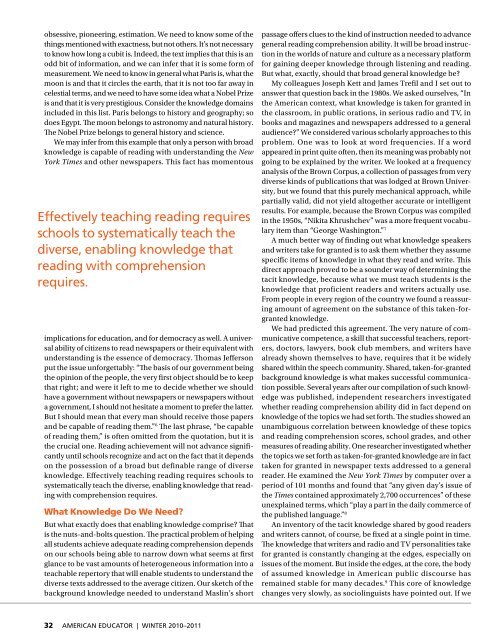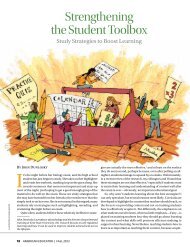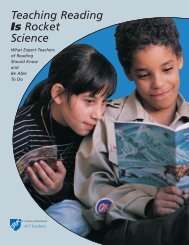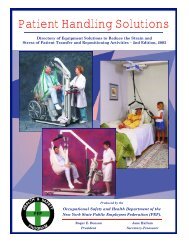American Educator, Winter 2010-11, Vol. 34, No. 4, AFT
American Educator, Winter 2010-11, Vol. 34, No. 4, AFT
American Educator, Winter 2010-11, Vol. 34, No. 4, AFT
You also want an ePaper? Increase the reach of your titles
YUMPU automatically turns print PDFs into web optimized ePapers that Google loves.
obsessive, pioneering, estimation. We need to know some of the<br />
things mentioned with exactness, but not others. It’s not necessary<br />
to know how long a cubit is. Indeed, the text implies that this is an<br />
odd bit of information, and we can infer that it is some form of<br />
measurement. We need to know in general what Paris is, what the<br />
moon is and that it circles the earth, that it is not too far away in<br />
celestial terms, and we need to have some idea what a <strong>No</strong>bel Prize<br />
is and that it is very prestigious. Consider the knowledge domains<br />
included in this list. Paris belongs to history and geography; so<br />
does Egypt. The moon belongs to astronomy and natural history.<br />
The <strong>No</strong>bel Prize belongs to general history and science.<br />
We may infer from this example that only a person with broad<br />
knowledge is capable of reading with understanding the New<br />
York Times and other newspapers. This fact has momentous<br />
Effectively teaching reading requires<br />
schools to systematically teach the<br />
diverse, enabling knowledge that<br />
reading with comprehension<br />
requires.<br />
implications for education, and for democracy as well. A universal<br />
ability of citizens to read newspapers or their equivalent with<br />
understanding is the essence of democracy. Thomas Jefferson<br />
put the issue unforgettably: “The basis of our government being<br />
the opinion of the people, the very first object should be to keep<br />
that right; and were it left to me to decide whether we should<br />
have a government without newspapers or newspapers without<br />
a government, I should not hesitate a moment to prefer the latter.<br />
But I should mean that every man should receive those papers<br />
and be capable of reading them.” 6 The last phrase, “be capable<br />
of reading them,” is often omitted from the quotation, but it is<br />
the crucial one. Reading achievement will not advance significantly<br />
until schools recognize and act on the fact that it depends<br />
on the possession of a broad but definable range of diverse<br />
knowledge. Effectively teaching reading requires schools to<br />
systematically teach the diverse, enabling knowledge that reading<br />
with comprehension requires.<br />
What Knowledge Do We Need?<br />
But what exactly does that enabling knowledge comprise? That<br />
is the nuts-and-bolts question. The practical problem of helping<br />
all students achieve adequate reading comprehension depends<br />
on our schools being able to narrow down what seems at first<br />
glance to be vast amounts of heterogeneous information into a<br />
teachable repertory that will enable students to understand the<br />
diverse texts addressed to the average citizen. Our sketch of the<br />
background knowledge needed to understand Maslin’s short<br />
32 AMERICAN EDUCATOR | WINTER <strong>2010</strong>–20<strong>11</strong><br />
passage offers clues to the kind of instruction needed to advance<br />
general reading comprehension ability. It will be broad instruction<br />
in the worlds of nature and culture as a necessary platform<br />
for gaining deeper knowledge through listening and reading.<br />
But what, exactly, should that broad general knowledge be?<br />
My colleagues Joseph Kett and James Trefil and I set out to<br />
answer that question back in the 1980s. We asked ourselves, “In<br />
the <strong>American</strong> context, what knowledge is taken for granted in<br />
the classroom, in public orations, in serious radio and TV, in<br />
books and magazines and newspapers addressed to a general<br />
audience?” We considered various scholarly approaches to this<br />
problem. One was to look at word frequencies. If a word<br />
appeared in print quite often, then its meaning was probably not<br />
going to be explained by the writer. We looked at a frequency<br />
analysis of the Brown Corpus, a collection of passages from very<br />
diverse kinds of publications that was lodged at Brown University,<br />
but we found that this purely mechanical approach, while<br />
partially valid, did not yield altogether accurate or intelligent<br />
results. For example, because the Brown Corpus was compiled<br />
in the 1950s, “Nikita Khrushchev” was a more frequent vocabulary<br />
item than “George Washington.” 7<br />
A much better way of finding out what knowledge speakers<br />
and writers take for granted is to ask them whether they assume<br />
specific items of knowledge in what they read and write. This<br />
direct approach proved to be a sounder way of determining the<br />
tacit knowledge, because what we must teach students is the<br />
knowledge that proficient readers and writers actually use.<br />
From people in every region of the country we found a reassuring<br />
amount of agreement on the substance of this taken-forgranted<br />
knowledge.<br />
We had predicted this agreement. The very nature of communicative<br />
competence, a skill that successful teachers, reporters,<br />
doctors, lawyers, book club members, and writers have<br />
already shown themselves to have, requires that it be widely<br />
shared within the speech community. Shared, taken-for-granted<br />
background knowledge is what makes successful communication<br />
possible. Several years after our compilation of such knowledge<br />
was published, independent researchers investigated<br />
whether reading comprehension ability did in fact depend on<br />
knowledge of the topics we had set forth. The studies showed an<br />
unambiguous correlation between knowledge of these topics<br />
and reading comprehension scores, school grades, and other<br />
measures of reading ability. One researcher investigated whether<br />
the topics we set forth as taken-for-granted knowledge are in fact<br />
taken for granted in newspaper texts addressed to a general<br />
reader. He examined the New York Times by computer over a<br />
period of 101 months and found that “any given day’s issue of<br />
the Times contained approximately 2,700 occurrences” of these<br />
unexplained terms, which “play a part in the daily commerce of<br />
the published language.” 8<br />
An inventory of the tacit knowledge shared by good readers<br />
and writers cannot, of course, be fixed at a single point in time.<br />
The knowledge that writers and radio and TV personalities take<br />
for granted is constantly changing at the edges, especially on<br />
issues of the moment. But inside the edges, at the core, the body<br />
of assumed knowledge in <strong>American</strong> public discourse has<br />
remained stable for many decades. 9 This core of knowledge<br />
changes very slowly, as sociolinguists have pointed out. If we





